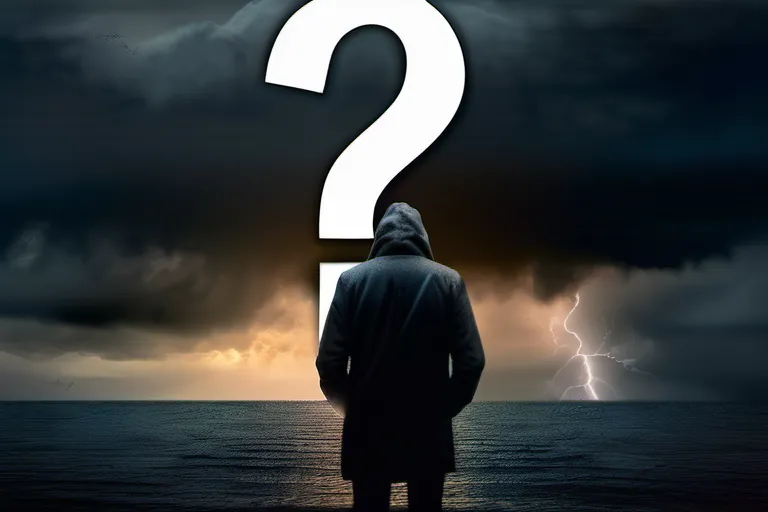Explore the philosophical, religious, and theological perspectives on why God allows evil to exist.
This article delves into the profound question of why a benevolent God would allow evil to exist in the world. We will examine various perspectives from philosophy, religion, and theology to gain a deeper understanding of this complex issue.
The Philosophical Perspective
What if life was like a vast chessboard, where every move matters, and each piece has its own role? And what if the grandmaster, God, deliberately allowed some pieces to falter for a greater purpose? This idea forms the basis of philosophical discussions on why evil exists in a world supposedly governed by a benevolent deity.
The age-old question, ‘Why does God allow evil?’ has intrigued philosophers and theologians alike. One perspective is that evil serves as a contrast, highlighting the value of good. If there were no darkness, how would we appreciate the light? This view posits that evil is not an absence but a presence, essential for the richness of our experience.
Another philosophical stance argues that free will necessitates the existence of evil. Without the option to choose otherwise, what would be the point of freedom? This idea suggests that God gives us the autonomy to make choices, even if some of those choices lead to suffering or harm. The question then becomes: Is it better to have a world where we can choose, with all its complications and sorrows, or one where we are predestined to live without such complexities?
Some philosophers delve into the concept of Negative Freedom, suggesting that true freedom involves the absence of constraints. Here, evil is seen as an inevitable byproduct of living in a world governed by natural laws and human actions. This perspective challenges the notion of God’s omnipotence or omnibenevolence, proposing instead that the universe operates on its own principles, independent of divine control.
Yet others propose a telos, or ultimate purpose, where evil is part of a larger plan. The philosopher Hegel believed in a dialectical process, where contradictions and conflicts lead to progress and enlightenment. In this view, every step, even those marred by suffering, contributes to the greater whole.
The complexity of these philosophical arguments cannot be understated. They challenge us to think deeply about our own beliefs and the nature of existence itself. As we ponder these questions, it’s clear that understanding why God allows evil involves not just religious or theological frameworks but a nuanced exploration of human freedom, moral philosophy, and the very fabric of reality.
Religious Interpretations
When delving into the realm of religious interpretations, we encounter a profound and enduring mystery: why does God allow evil to exist? Various religions offer their unique perspectives on this conundrum, seeking to reconcile the presence of evil with the concept of a benevolent deity. Is it a test of our free will, or is there something more subtle at play?
In Judaism, the idea that God allows evil can be seen as a way to strengthen faith and moral development. The story of Job in the Hebrew Bible illustrates this notion vividly: despite his unwavering devotion, Job is tested with unimaginable suffering. Some interpreters suggest that these trials are meant to refine character, much like how fire refines gold.
In Christianity, the concept of original sin plays a crucial role. According to many Christian traditions, human beings inherit a sinful nature from Adam and Eve, which introduces evil into the world. However, some theologians argue that even this can be seen as part of God’s overarching plan for redemption through Christ’s sacrifice.
In Islam, the idea of trial or test (amanah) is central. Believers are often tested to see their true intentions and commitment to faith. The presence of evil, in this view, serves as a means for God to distinguish between those who truly believe and those who do not.
The wisdom behind these interpretations varies widely but often revolves around the idea that suffering and evil provide opportunities for spiritual growth, learning, and understanding. Yet, the question remains: if God is all-powerful and benevolent, why would he permit such profound evil?
In exploring these religious views, one cannot help but wonder about the balance between free will and divine control. Is it possible that God permits evil to exist as a means of allowing us to make meaningful choices? Or does this suggest a gap in our understanding of God’s nature or the complexity of existence itself?
No matter how we approach this mystery, the search for answers deeply resonates with humanity’s quest for meaning and purpose. As we navigate these complex theological landscapes, it is clear that the question of evil remains one of the most profound challenges in understanding our world and our relationship to God.
Theological Explanations
Why would a benevolent God allow evil to exist? This question has puzzled philosophers, theologians, and believers for centuries. Imagine a grand architect designing a perfect world; how can one explain the inclusion of flawed bricks in its construction?
In theology, this conundrum is often referred to as the ‘problem of evil.’ It poses a significant challenge to the concept of an omnipotent, omnibenevolent, and omniscient God. One explanation is that God created beings with free will, which includes the potential for both good and evil actions. If God were to predestine every action, would this still be truly free will?
Another theological perspective suggests that the presence of evil can lead to greater moral growth and understanding. Just as a diamond’s brilliance is enhanced by the darkness in which it is set, perhaps our understanding of goodness is more profound because we have experienced evil. This idea, known as ‘theodicy,’ posits that evil serves a purpose beyond human comprehension.
Some argue that God does not directly cause evil but allows it to occur for various reasons. Perhaps allowing free will means that evil can arise, yet still be defeated by good. This view highlights the concept of a world in a state of constant conflict between righteousness and wickedness, where ultimate justice may only be realized through divine intervention at some future point.
While these explanations provide insightful frameworks, they often leave more questions than answers. How can we reconcile the existence of evil with our understanding of a loving God? Perhaps the mystery lies not in finding a single explanation but in recognizing that this question itself is part of the human condition—a reminder of the complexity and depth of faith.
Free Will and Moral Evil
How can we reconcile free will with the existence of moral evil in our world? It’s like trying to understand why a playwright allows their characters to make tragic choices, even though they could have written an entirely different story where goodness triumphs. If God has supreme power and wisdom, shouldn’t He be able to prevent or guide us away from making harmful decisions?
Many theologians suggest that free will is essential for moral evil to exist because without the ability to make choices, there can be no genuine morality. Just as a tree needs sunlight and rain to grow, humans need the opportunity to choose between good and evil to develop true character. But if every choice was predetermined or controlled, would our actions really matter? Would we be more like puppets on strings than free agents capable of making meaningful decisions?
This concept is often illustrated by the idea that a world without evil might not have the same depth and richness as one where good and evil coexist. Just as a chess game becomes less exciting if every move is predictable, life loses its complexity and significance when every choice leads to virtue.
The challenge for believers then becomes navigating this tension: how do we accept that God allows moral evil in our world while still believing in His goodness and sovereignty? Perhaps the answer lies in understanding that evil is not a separate entity from us but rather a result of our choices, influenced by free will. It’s as if God has given us free agency to explore the depths of both good and evil, much like exploring a vast landscape where the beauty of a mountain range emerges only against the backdrop of valleys.
So, in grappling with this mystery, we might ask: is it not more meaningful to understand our world through the lens of choice and responsibility, even if it means embracing the complexity and often painful reality of moral evil?
Natural Disasters and Suffering
Imagine a world where nature unleashes its fury, and we find ourselves grappling with questions that pierce through the fabric of our understanding: why do natural disasters occur? How can they exist if there is an all-powerful, benevolent God who cares for humanity? These questions are not just academic; they resonate deeply within us, challenging our beliefs and forcing us to confront the enigma of evil.
Natural disasters like hurricanes, earthquakes, and wildfires often seem to defy explanation. They are a stark reminder of the relentless power of nature, which can be both a source of beauty and a harbinger of destruction. But when these forces strike without warning, they raise profound questions: If God is all-powerful and all-good, why does He allow such tragedies? Is it not His job to protect us from harm?
One perspective sees natural disasters as part of the greater cosmic order, where balance and change are constant. Some argue that these events serve a purpose beyond human comprehension, perhaps purging the world of toxic elements or creating new opportunities for growth. However, this view can be difficult to reconcile with the immediate suffering they cause.
Theological perspectives vary widely on how to interpret natural disasters. Some believe in predestination, where every event is predetermined and part of a divine plan. This belief can offer comfort but also raises unsettling questions about human free will. Others see natural disasters as tests or trials, meant to strengthen our faith and resilience.
No matter the perspective, the reality of suffering due to natural disasters forces us to face the harsh truth: evil is not just a result of human actions but can be embedded in the very fabric of the universe. How we respond to this challenge—whether through despair or hope—often determines our spiritual and emotional well-being.
In exploring these questions, we are not merely seeking answers; we are engaged in a profound dialogue with ourselves and our faith. The mystery of God and evil remains unresolved, but the journey towards understanding is essential for navigating life’s tumultuous storms.
The Problem of Evil and Faith
How can we reconcile the existence of evil with our belief in a loving, all-powerful God? The problem of evil challenges faith deeply, making us wonder if our understanding of divine nature is flawed or incomplete. Could it be that evil and suffering are necessary evils that serve some greater purpose, like pieces of a complex puzzle? Or perhaps the concept of an omnipotent and benevolent deity needs redefinition in light of these challenges.
Philosophers have pondered this question for centuries. Søren Kierkegaard suggested that our struggle with the problem of evil is part of our human condition, a test of faith that deepens our relationship with the divine. On the other hand, Bertrand Russell famously argued that the existence of evil casts doubt on God’s goodness and omnipotence, questioning the very basis of religious belief.
In religious texts, particularly in Job, we see narratives where righteous individuals face unimaginable suffering without clear answers. This raises questions about divine justice and God’s will. Could it be that the Bible itself acknowledges the complexity of evil by presenting stories where mystery is central to faith?
Theological perspectives vary widely, with some arguing for a free-will defense, suggesting that allowing free will necessitates the possibility of evil. Others propose that our limited understanding cannot grasp God’s wisdom and purpose behind permitting evil in the world.
No matter which perspective we adopt, grappling with the problem of evil is an essential aspect of spiritual growth and reflection. It pushes us to question, to explore, and ultimately, to deepen our understanding not only of God but also of ourselves and our place in the universe. The journey through these complexities can be daunting, yet it holds the promise of profound insights into the nature of existence and our eternal quest for meaning.
Conclusion
 By the end of this article, you will have gained valuable insights into the reasons behind God’s apparent tolerance of evil and how these ideas can help shape your own beliefs and understanding of the world.
By the end of this article, you will have gained valuable insights into the reasons behind God’s apparent tolerance of evil and how these ideas can help shape your own beliefs and understanding of the world.











